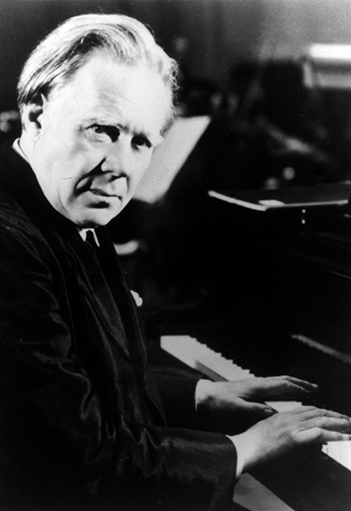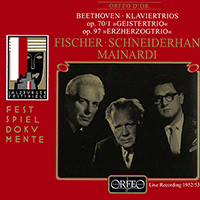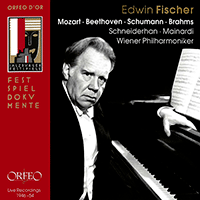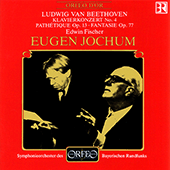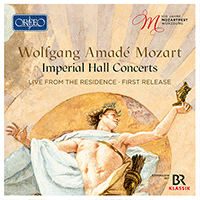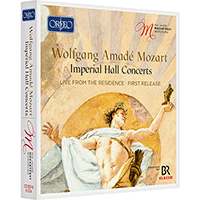Edwin Fischer
Both of Edwin Fischer’s parents were musical and their talented son began piano lessons at the age of four. At ten, Fischer entered the Basle Conservatory where he studied with the composer Hans Huber. When Fischer was eighteen his father died, so his mother, with whom he had a close relationship, took him to Berlin to study at the Stern Conservatory with Liszt pupil Martin Krause, who would later teach Claudio Arrau. Whilst in Berlin Fischer made his concerto debut with the Piano Concerto No. 2 by Eugen d’Albert who was greatly impressed and offered advice and help in his career to the young pianist. After a period of teaching at the Stern Conservatory, Fischer gave recitals and at this time appeared with such eminent conductors as Willem Mengelberg, Arthur Nikisch, and Bruno Walter. He toured in Europe and Britain, but gave only a limited number of concerts.
In the late 1920s Fischer concentrated more on ensemble playing, first by conducting the Lübeck Musikverein and Munich Bachverein and in 1930 forming his own chamber orchestra of Berlin musicians, which he conducted from the keyboard. He also played in a trio with violinist Georg Kulenkampff and cellist Enrico Mainardi. In 1931 Fischer succeeded Artur Schnabel as director of the Berlin Hochschule für Musik, a post he held for four years, and in 1938 he made his Salzburg Festival debut with Mozart’s Piano Concerto in D minor K. 466. During World War II Fischer returned to his native Switzerland from where he gave master-classes and continued to tour until 1954 when he stopped performing in public as he was suffering from a paralysis of his hands. During 1950 Fischer gave a series of concerts in London and other European cities to commemorate the bicentenary of Bach’s death. In these concerts he played all the concertos for keyboard.
Fischer published Reflections on Music, and wrote on the Beethoven piano sonatas and on Bach. He also published editions of Bach’s keyboard works and Mozart’s piano sonatas. He was awarded an honorary doctorate from the University of Cologne for his distinguished services to music.
Fischer’s repertoire was dominated by Bach, Beethoven, Mozart, and Schubert. He also played Chopin and Schumann, but had a wide knowledge of the piano repertoire. Describing Fischer’s pianistic personality is not easy. He was a genuinely honest and kind person whose humanity shone through his music in performances that contained a beautiful, seamless legato, and a pellucid tone quality that is unique to Fischer. He found all things spiritual extremely important to his life as a musician, always searching for the true inner spirit of the music he was interpreting, and longing for ‘…that grace of the quiet hour when the spirit of the composer speaks to us, that unconscious moment when one is raised out of oneself’. (The spiritual purity Fischer was searching for in music is something that today seems to have been forgotten, or is thought to be unimportant as the pressures of piano competitions and a modern lifestyle detach pianists from nature, great literature and the visual arts.)
Edwin Fischer was the first pianist to make a complete recording of Bach’s Das wohltemperierte Klavier which he commenced in 1933. Previously Harriet Cohen and Evlyn Howard-Jones had begun to record the series, but it was eventually abandoned and left incomplete. Fischer’s is still one of the greatest of the complete recordings of Das wohltemperierte Klavier on the piano, even though by today’s standards it may not be ‘historically accurate’ in ornamentation and style. Fischer surrounds the slow preludes with his luminous haze, yet clarity and articulation are always foremost, even if the overall tempo may waver; he makes them sound beautiful yet never romanticised or cloying. Perhaps the best adumbration of Fischer’s musical outlook is his recording of Bach’s Chromatic Fantasy and Fugue recorded in 1931. The Fantasy sounds more like an improvisation with Fischer not fearing to double notes and use extremes of dynamic, his pianissimo being almost hypnotic as it draws the listener in. He makes this Fantasy into an improvisational poem, at times creating moments of aching beauty. He brings the same qualities to Busoni’s arrangement of Bach’s Chorale Ich ruf’zu dir.
At Fischer’s first recording sessions he also recorded Handel’s Chaconne in G major and three years later recorded movements from the same composer’s Suite No. 3 in D minor. Again, these have a wonderfully reflective and inspirational quality.
Many of Fischer’s radio broadcasts have been issued on compact disc, but some of these do not do him justice as he was old and his technique was failing when they were recorded; or they are in poor sound, giving an untrue representation of his wonderful tone.
Of the Beethoven recordings, Fischer’s second version of Beethoven’s ‘Emperor’ Concerto Op. 73 recorded with Furtwängler in 1951 is the better, and is thought by some to be one of the best recorded versions of the work. Of the Beethoven piano sonatas, Fischer’s Op. 110 is extremely fine, as are the ‘Appassionata’ and ‘Pathétique’ Sonatas recorded in the 1930s. Mention should be made of his Mozart piano concertos and Bach keyboard concertos that he conducted himself, although today the Bach concertos do sound rather heavy-footed. In 1954 Fischer made his last series of recordings for EMI/HMV in London. With the Philharmonia Orchestra he recorded Mozart’s Concerto in D minor K. 466 (which he had previously recorded in 1933 with the London Philharmonic Orchestra) and Beethoven’s Piano Concertos Nos 2 and 3, all of which he conducted from the keyboard. As accompanist he recorded Brahms’s Violin Sonatas Nos 1 and 3 with Gioconda de Vito and some Beethoven sonatas. It is, however, the earlier Beethoven sonatas from the 1930s as well as the Schubert impromptus from this period that prove Fischer to be one of the greatest of pianists.
© Naxos Rights International Ltd. — Jonathan Summers (A–Z of Pianists, Naxos 8.558107–10).







